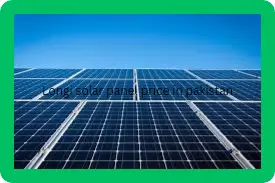In Pakistan, financing options for solar systems have become more accessible due to increasing awareness and government initiatives aimed at promoting renewable energy. Here are some common methods for financing solar installations:
- Government Incentives and Subsidies: The Pakistani government, through organizations like the Alternative Energy Development Board (AEDB) and the Ministry of Energy, offers various incentives for solar energy projects. These may include subsidies, tax breaks, and duty-free imports of solar equipment.Applying for the Punjab solar scheme typically involves several steps. Here’s a general guide on how you can apply:
- Check Eligibility: Ensure you meet the eligibility criteria set by the Punjab government for the solar scheme. This usually includes factors such as residency, type of property, and sometimes income levels.
- Select a Vendor: Choose an empaneled vendor or installer who is recognized by the Punjab government for installing solar panels. The list of these vendors can often be found on official government websites or through local government offices.
- Get a Site Assessment: Contact the chosen vendor to conduct a site assessment of your property. They will evaluate the feasibility of installing solar panels based on factors like roof orientation, shading, and available space.
- Obtain Quotations: Once the site assessment is done, the vendor will provide you with a detailed quotation outlining the cost of the solar system installation, including equipment, installation charges, and any applicable taxes.
- Apply for Subsidy (if applicable): Check if there are any subsidies or financial incentives available for installing solar panels in Punjab. If there are, follow the procedure to apply for these subsidies, which may involve submitting specific documents or forms.
- Documentation: Prepare necessary documents such as ID proof, property ownership documents, and any other paperwork required by the vendor or the government for processing your application.
- Installation: After finalizing the vendor and completing the paperwork, schedule the installation of the solar panels as per the agreed timeline with the vendor.
- Post-Installation Inspection: After installation, there might be a requirement for a post-installation inspection by government authorities or the vendor to ensure compliance with safety and performance standards.
- Connection to Grid (if applicable): If you opt for grid-tied solar systems, coordinate with your electricity provider to connect your solar system to the grid. This step may involve additional paperwork and inspections.
- Claiming Subsidy (if applicable): Once everything is installed and approved, if you applied for a subsidy, follow up with the concerned authorities to claim your subsidy according to their guidelines.
- Maintenance and Monitoring: Regularly maintain and monitor your solar system to ensure optimal performance and longevity.
- Each solar scheme may have specific nuances and requirements, so it’s advisable to check the official website of the Punjab government or contact local authorities for detailed and updated information regarding the application process.
- Commercial Banks and Financial Institutions: Several banks in Pakistan provide loans specifically for solar energy projects. These loans often come with favorable terms, including low-interest rates and extended repayment periods. Banks such as Habib Bank Limited (HBL), United Bank Limited (UBL), and MCB Bank offer such financial products.
- Green Financing Schemes: Institutions like the Pakistan Industrial Credit and Investment Corporation (PICIC) offer green financing schemes that are specifically designed to support renewable energy projects, including solar systems.
- Solar Leasing: Some companies offer solar leasing options where you can lease solar equipment instead of purchasing it outright. This allows you to use solar energy with minimal upfront costs and pay a monthly fee.
- Public-Private Partnerships: Various public-private partnership programs are available, where private entities and government agencies collaborate to provide solar energy solutions, often with financial assistance.
- NGOs and Development Agencies: Non-governmental organizations and international development agencies sometimes offer grants or low-interest loans for solar projects, particularly in rural or underserved areas.
- Crowdfunding and Investment Platforms: Emerging platforms allow individuals and businesses to invest in or crowdfund solar projects, making it easier to raise capital for solar installations.
If you’re considering installing a solar system, it’s advisable to consult with local financial institutions or solar energy companies to explore the most suitable financing options available for your specific needs.
